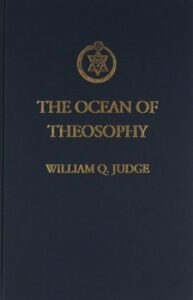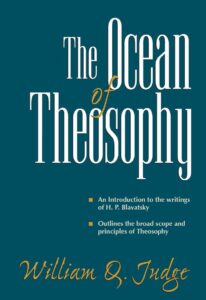Studies In The Ocean of Theosophy Part XXV
Theosophy Magazine
Vol. 23., No. 1 November 1934
pages 33 -36
LIFE being Unity, many a clue to her mysteries may be found by correspondence and analogy. Through these, self-identification with the physical and addiction to finalities may be overcome. Studied by this method, the daily cycle yields the key to the realization of individual continuity. Its magic can transmute termination into transition, envisaging mightier Cycles of birth and re-birth, or waking and re-awaking, of which lesser rounds of experience are but segments. Not the form sleeping upon its couch, but the indwelling intelligence departs into the land of dreams, to return at dawn; and when that form no longer pulses with the life-breath, the living Soul, freed from its weight, pursues his Karmic course in deeper Lands of Dream, until the duty calls him back to earth.
With the change called death, the spiritual being, divested first of physical and then of astral elements, falls into deep slumber, similar to the “term of darkness and heavy sleep” preluding physical birth. Awaking from this oblivion, clothed “with a vesture which cannot be called body but may be styled means or vehicle”, the “higher principles, Atma-Buddhi-Manas, begin to think in a manner different from that which the body and brain permitted in life.” Thence, all functioning is “entirely on the plane of mind and soul”; yet the Devachanic Vesture, drawn from the highest and finest of the past lifetime, extends the sense of personality throughout the long rest period of hundreds of years — fifteen hundred, for the average man.
So synthetic is Theosophy that the various phases of its teaching are complementary at every point, so inter-blended that no aspect can be extensively considered alone; but each corroborates and emphasizes all the rest. For instance, this “general average of the stay in devachan gives us the length of a very important human cycle, the Cycle of Reincarnation.” Under this law of periodicity, “national development will be found to repeat itself, and the times that are past will be found to come again.” What could bring about such repetition if not the ideas underlying; and who but the thinkers could repeat these ideas? And, too, it is not alone ideas and their resultant general conditions that thus periodically repeat, but also the physical types representative of them — all of which should open enticing fields of investigation and observation for the historian!
There are many objections to Reincarnation met by the doctrine of Devachan. For one thing, the idea of tedium in an incessant round of rebirths loses all significance when it is considered how little of existence is spent on this plane of being. About one-third of the time is passed in sleep. The subtraction of this from a lifetime of seventy years leaves less than forty-seven years of waking consciousness. If this be followed by fifteen-hundred years of rest, complaint is scarcely warrantable. He would be a lazy man, indeed, who would be a-wearied by spending less than one-sixteenth of his day at work.
Again, aversion to life’s tribulations should give way before the preponderance of peace indicated for this vast individual cycle. Far transcending the God-and-angel “heaven”, that which Nature offers is rooted in actual experiences, here, affording compensation many fold for all hardship suffered. In fact, it would almost seem to provide reward surpassing and out-measuring merit, though this could not obtain in a universe of Law. But, surely, sting of injustice in mundane existence and the lash of fear at the thought of death should disappear before apprehension of the inherent intelligence that so beneficently decrees long requital for short trial.
All that befalls, either before or after death, is self-bestowed. Whether joy or woe, it flows from the use made of the ever-present now, as its moments flit by. Kama Loka, Devachan, and the tendencies of future incarnations depend upon this alone. No other experience could weave Buddhi into the Devachanic robe. Possibly the stark grimness of life may contribute its brightest colors, when met with fortitude. Certainly, the attitude towards the hazards of daily living must have much to do with the extent of the after-death states; while the cords that eventually draw the Ego back to physical birth are twisted of strands of thought and feeling during his prior embodiment. These skandhas are the materials furnished by the Lord of the Manor for his new earthly home. It is their quality that determines the tensile strength of his instrument, as expressed in its native cycles of rise and decline and its limit of endurance.
It is of interest that the rise and fall of force characterize action on all planes. Just as physical life rises to its zenith, declines, and ceases, so it is with the play of force in Kama Loka, and also its expression in Devachan. All these various classes of force emanate from corresponding departments of the man’s own being, since all these states exist within him. The up-rush of unrestrained high feeling having expanded to its limit in Devachanic consciousness it is gradually exhausted. Then, “the whole period allotted by the soul’s forces being ended in devachan, the magnetic threads which bind it to earth begin to assert their power. The Self wakes from the dream; it is borne swiftly off to a new body, and then, just before birth, it sees for a moment all the causes that led it to devachan and back to the life it is about to begin.” Knowing the justice of it all, the Ego “repines not but takes up the cross again — and another soul has come back to earth.”
Many people hold to the possibility of continuing mortal life indefinitely; and if, like “the ethereal garments of devachan”, the “molecules that form the physical body were not subject to the general chemical laws that govern physical earth, then we should live as long in these bodies as we do in the devachanic state. But such a life of endless strain and suffering would be enough to blast the soul compelled to undergo it. Pleasure would then be pain, and surfeit would end but in an immortal insanity. Nature, always kind, leads us soon again into heaven for a rest, for the flowering of the best and highest in our natures.”
While intense mental activity continues throughout the Devachanic state, there is no comprehension of it, much as when the mind falls into a brown study or is occupied by a day dream. When these have passed, the living recognize their engagement in them; but no such recognition is possible in after-death meditation. Like Kama Loka, Devachan is solitary in its abstraction, although the mental field is peopled with whomsoever desired and vividly present. This fact should be of tremendous appeal to the Christian of decided personal preferences. For, barring the extinction of uncongenial associates, the orthodox heaven must provide place for them, necessitating contact. Think of being relieved from unwelcome faces at the pearly gates and while strolling on the streets of gold or floating in the celestial atmosphere! Such “Heaven”, would be marred by many an uncomfortable adjustment; but Devachan can lack nothing that appeals, hold nothing that repels. What the being would have, that the mind creates and naught else.
Sometimes, objection to the teaching of Devachan is raised on the grounds that the man would be fooled, the enjoyer of spurious happiness; but this objection quite overlooks the fact that the enjoyment is real. And as to the stage-setting of this state: “We are too prone to measure all possible states of life and places for experience by our present earthly one and to imagine it to be reality.” In point of fact, just how real is this environment concerning which our physical senses give testimony? The whole Teaching emphasizes the fact that we are not what we ordinarily believe ourselves to be while functioning here; and, certainly, perceptions from a false assumption of identity can not be wholly true. Even materialistic Science recognizes so-called matter to be but the phenomenal effect of invisible substance. Objects seen are really our ideas of objects. All perceptions are internal, and, although common testimony points to similarity of mental conceptions, what unqualified assurance is there that the ideas of any two persons regarding a specific object exactly tally? Each being lives in a world of his own, unreachably, inviolably private, whence he reacts to impressions received in his own individual way. All this indicates that our vaunted earthly “reality” may itself be a good deal of a dream world.
Nevertheless, enough points of contact and evidences of mutual experience do exist to establish understanding and practical cooperation. No one can inwardly doubt the common way travelled. It is the lack of contacts and of contrasts that produces the illusionary character of Devachan. But it is not a cheat, in any sense, nor meaningless, nor futile. On the contrary, it nourishes and furthers the best in the nature, as well as compensating for all lack in the lifetime just terminated and providing refreshment for the Soul. Nor, so it would seem, is its light utterly extinguished when the being again sets foot on earth. The shining joy in the eyes of childhood suggest it and purveys solace to the adult jaded by life’s struggle. Some have even thought they glimpsed this same light in the eyes of the aged whose bonds with flesh were loosening.
Yet, beneficent though it be, were mankind to seek and follow the true lines of evolution, Devachan would gradually cease to be necessary or desirable. Wiser minds would find re-birth more quickly. Life cycles energized by will and devoted to high purposes would add a greater number of perfected beings to each turn of the Wheel. The natural processes of unfoldment, unobstructed, would quicken progress to the point where the Great would once more walk with men and still further accelerate their advancement. As the human Principles, thus elevated, become clear and shining, so, consequently, would be the corresponding sheaths of the planet. Then, there would be need for no other heaven than this old earth itself — not a state of divine illusion, but a state of wisdom.
Back to The Ocean of Theosophy



